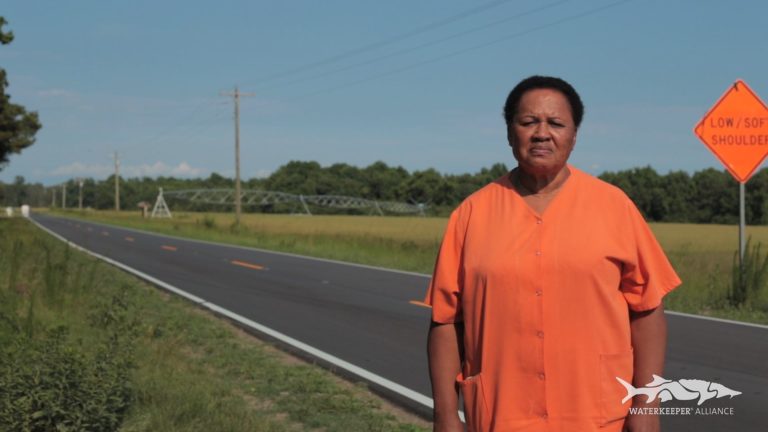Community, Environmental Groups File Constitutional Challenge to Laws Limiting Individual Property Rights
By: Waterkeeper Alliance

North Carolina environmental and community groups today filed a constitutional challenge to state laws limiting nuisance suits against industrial hog operations, contending these laws violate due process and property rights under the state Constitution.
The suit, filed in Wake County, challenges House Bill 467 and Senate Bill 711, which passed over the governor’s vetoes in 2017 and 2018, respectively. The suit, which will be heard by a three-judge panel the Chief Justice of the state supreme court will appoint, contends the state deprived North Carolinians of their constitutional rights by limiting environmental nuisance remedies and claims.
The organizations argue that the unreasonable restrictions on nuisance suits are unconstitutional “special” laws designed to protect a corporation, that they interfere with the right to trial by jury, and that they deprive residents of their fundamental right to property.
Plaintiff organizations are the North Carolina Environmental Justice Network, the Rural Empowerment Association for Community Help, Waterkeeper Alliance, and Winyah Rivers Alliance, parent organization of the Lumber Riverkeeper and Waccamaw Riverkeeper. The plaintiffs are represented by the Julius L. Chambers Center for Civil Rights and the Lawyers Committee for Civil Rights Under Law.
North Carolina is the nation’s No. 2 pork producer after Iowa; it has the highest concentration of swine operations in the country. Most of the state’s nearly 10 million hogs live on industrial swine operations, where the 9.5 billion gallons of waste they produce each year are stored in open cesspools and applied, usually by jet-powered sprayers, on nearby cropland.
The EPA’s Civil Rights Compliance Office in 2017 warned the state’s Department of Environmental Quality of its “deep concern about the possibility that African Americans, Latinos, and Native Americans have been subjected to discrimination” in violation of Title VI of the Civil Rights Act, as a result of how the state governed management of swine waste.
The organizations, filing suit on behalf of their members who live near industrial hog facilities, contend that, among other harms, the stench, noxious gases, and particulate pollution from these operations deprive residents of their right to use and enjoy their property. African Americans, Latinos and Native Americans in North Carolina are about twice as likely as whites to live within three miles of an industrial hog operation.
Devon Hall, REACH’s co-founder and program manager, lives near more than a dozen industrial hog operations. “This is my family’s homeplace,” Mr. Hall said. “Although I am not a plaintiff in the ongoing nuisance case, I believe that the North Carolina General Assembly overstepped its constitutional grounds to block me or anyone else from seeking justice in court from anyone that has caused unreasonable harm to a neighbor.” Mr. Hall added, “How is it that the state can take away my community’s ability to protect our homes and health? How can that be right?”
Ayo Wilson, administrative co-director at NC Environmental Justice Network, said, “Legislation shouldn’t protect any industry over the people and the environment. HB467 and SB711 expose the industry’s extraordinary influence on the General Assembly. This legislation is an unconstitutional assault on the fundamental rights of property owners to use and enjoy their property, totally strips low-wealth communities and residents of color of their property rights, and does nothing to promote or protect the health, safety, or well-being of communities or residents impacted by industrial agriculture. Folks here in North Carolina deserve better.”
Will Hendrick, staff attorney at Waterkeeper Alliance, said, “This suit challenges recent limits to legal rights that predated North Carolina’s statehood. The General Assembly passed those limits after neighbors of industrial hog operations in North Carolina won federal lawsuits based on those longstanding rights. Laws should be made to protect North Carolinians from proven harm, not strip them of their rights.”
Christine Ellis, executive director of Winyah Rivers Alliance, said, “Everyone has a constitutional right to their property — including the right to drink an iced tea on their porch without choking on sprayed droplets of hog manure. Neighbors held the hog industry accountable is a nuisance action. The state has taken that away with this legislation. That’s not just wrong, it also violates the North Carolina Constitution.”
“The North Carolina constitution prohibits the legislature from passing special laws to benefit one corporation and this case is the perfect illustration,” stated Jon Greenbaum, chief counsel of the Lawyers’ Committee for Civil Rights Under Law and co-counsel for plaintiffs in the suit. “Our clients and many other North Carolina residents have been significantly harmed by the waste caused by Smithfield Foods and they have the constitutional right to be made whole by Smithfield Foods. The legislature cannot take that right away.”
“These changes to the law deprive North Carolinians living near industrial hog operations of the only remedy every other property owner has to protect the sanctity, value, and enjoyment of their homes,” said Elizabeth Haddix, Co-Director of the Chambers Center and co-counsel for the plaintiffs. “This law is not about the ‘right to farm;’ it’s about giving industry an unconstitutional right to harm.”